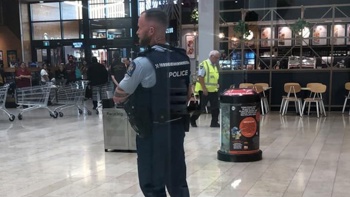New Zealand will move to phase 3 of the Omicron response at 11.59pm, after 6137 new community cases of Covid-19 and one death were reported today.
Speaking before today's data was announced, Covid Response Minister Chris Hipkins said case numbers meant New Zealand would quickly move to the third phase of the Omicron response.
"I don't think the shift is going to come as a surprise to many people," Hipkins said.
"Phase three won't mean any sudden lurch in terms of personal movements or restrictions."
The ministry announced there were 205 people in hospital, including two in intensive care, in their update about 1.40pm.
There was also a Covid-19 related death - a patient with coronavirus at Middlemore Hospital.
There are 305 cases in the Southern DHB area today after concerns about student parties in Dunedin could become super-spreader events.
Hipkins earlier today said safety, without major disruption, was a major priority.
"It will only be confirmed cases and their household contacts who will be required to isolate."
In its update today, the Ministry of Health broke down the location of today's community cases by PCR test results and RAT results.
The location of today's reported community cases that were detected via PCR test are in: Northland (56), Auckland (1,979), Waikato (314), Bay of Plenty (116), Lakes (75), Hawke's Bay (30), MidCentral (69), Whanganui (13), Taranaki (30), Tairāwhiti (26), Wairarapa (11), Capital and Coast (120), Hutt Valley (68), Nelson Marlborough (112), Canterbury (194), South Canterbury (3), Southern (305) and the West Coast (4).
Community cases detected via RATs have been reported in: Northland (24), Auckland (1,900), Waikato (163), Bay of Plenty (75), Lakes (16), Hawke's Bay (30), MidCentral (8), Whanganui (4), Taranaki (4), Wairarapa (4), Capital and Coast (44), Hutt Valley (5), Nelson Marlborough (11), Canterbury (43), South Canterbury (3) and the Southern region (290).
Meanwhile, eight Covid-19 cases have been detected at the border.
Overall, of today's 6137 community cases, 3526 were detected via PCR tests and 2611 were identified using RATs.
In total, there are now 27,611 active community cases of Covid-19.
In the last 24 hours, 33,225 PCR Covid-19 tests were processed.
New Zealand's positivity rate - the percentage of tests that are positive - for the last 24 hours is 10.9 per cent.
This is a slight decline on yesterday's reported positivity rate of 12.2 per cent.
The PCR tests rolling average for the last seven days is 29,085.
There are currently 6.3m RATs in the country.
RATS available across the country
Rapid antigen tests will be available at thousands of sites nationwide and should be available to buy at retail outlets from next month.
"And we've got millions more of them arriving in the coming days," Hipkins said today.
The new phase would also focus more on self-notification, in other words, the onus will be on positive cases alerting their household contacts.
"Hospitalisation now becomes a major focus," he added.
Practical changes to ease pressure over the next three to six weeks would be crucial to protecting healthcare providers and crucial supply chains.
"We will get through this. We've seen and learned from what's happening overseas."
The Covid-19 minister said high vaccination levels and Omicron's relative mildness meant this new devolved approach was practical.
High vaccination rates would help New Zealand get through the next phase of the pandemic, Hipkins said.
"We still strongly encourage people to get their booster doses if they have not already done so."
Hipkins said clinical care would be important for people with higher needs.
"I want to reinforce that we have carefully planned for this. Keep supporting one another and we will get through this."
The minister said test kits were being distributed around the national health network.
"We are seeing a big surge in demand for testing," Hipkins added.
Hipkins said there were now 205 people in hospital. This is up from 179 yesterday.
He urged people to check with local GPs if rapid tests were available at their preferred location.
"We are getting them out to places...there can be a mismatch between demand and supply."
Meanwhile the protest at Parliament is now deemed a "high-risk" Covid location of interest. Health officials updated the locations list just after midday to include the camp outside Parliament.
Hipkins said police who were at the convoy protest would follow whatever health guidance was issued.
Dr Ashley Bloomfield said the move to phase three was advisable due to the roughly 5,000 confirmed cases and the high demand for testing.
Testing at GPs and other places should ease the pressure on laboratories previously used for testing, Bloomfield added.
People should advise employers of any positive test results, Bloomfield said.
He said health authorities would carry out whole genome sequencing on any new overseas arrivals who tested positive.
Bloomfield said the ministry was also contemplating how Omicron would impact critical supply chain workers.
Household contacts were most likely to be infected as secondary cases, he said.
"We're asking cases to self-register and let their contacts know."
He said people who test positive should reconsider visiting elderly relatives.
"This is a time to be really mindful about who you visit over these coming weeks.
"Our modelling of the low transmission scenario...assumes high rates of booster update," Bloomfield added.
About 70 per cent of eligible people had received booster shots, and this proportion needed to rise, he said.
Bloomfield said one new American Medical Association journal found boosters reduced Omicron infection by about two-thirds and Delta infection by more than 90 per cent.
Capacity did exist in hospitals nationwide but it is still important to prevent more pressure being piled on the system, Bloomfield added.
Hipkins addressed the new definition of contacts.
"We've worked really hard over the last few weeks to get this as clear as possible," Hipkins said.
On families at risk of over-isolating, Hipkins confirmed a person who had a household member with Covid-19 would be required to isolate.
On guidance for sending children to school, Hipkins said it was only household contacts that had to isolate.
He said detailed guidance would be sent out to schools "but the fundamental premise remains the same - if you have someone in your household who has Covid-19 you are required to isolate."
He said parents would make their own judgements in some cases, and he expected schools to make "pragmatic" decisions on it.
He said schools and ECEs were taking a low tolerance approach to children who had any symptoms. "I acknowledge that puts pressure on some families, and some are in a better position to deal with it than others."
Bloomfield said that under phase 3, most people would be self-managing. People would be texted, and there would be follow-ups to assess whether they needed more support.
He said RATs would go into the system, and health would identify whether they needed help.
Bloomfield repeated the dictum that everyone should act as if they might have Covid, and act accordingly to protect other people.
"It doesn't really matter if it's Delta or Omicron," he said in this context, although Delta carried a higher risk of hospitalisation.
Bloomfield said PCR test swabs fell about 40 per cent yesterday, but 14,000 rapid tests were handed out.
"If you have any symptoms or you might have been a contact, then go and get a test."
The director general was asked about fatigue people might have about rules.
"It has been a rapid rise over these past two weeks," he said of new cases.
He didn't directly answer the question but said the ministry was trying to be as clear about the guidelines as possible.
Being thoughtful and taking appropriate precautions was advisable, Bloomfield said.
On protesters at Parliament, Bloomfield said: "I would expect them to do what we're expecting of all New Zealanders, and that's essentially trying to do the right thing to protect other people."
Bloomfield said some protesters at Parliament were going to become unwell, and some had already presented at hospital and tested positive for Covid-19.
Bloomfield said currently, hospitalisation rates for Omicron were similar to levels overseas.
"There will be cases that don't even make it into our official numbers," he added.
Bloomfield said throughout the pandemic, health officials used testing rates and local epidemiological data to get a steer on overall case numbers.
But total case numbers weren't necessarily as important to know as the impact on hospitals was, Bloomfield added.
Hipkins said the Government would closely watch rapid test kit sales prices to ensure nobody was price-gouging.
Hipkins said making RATs more widely available would depend on private suppliers to be able to source them. He encouraged people bringing in RATs to use the ones that had been approved in New Zealand "but we will not be searching every bag coming in."
He said the price would be determined by the market - but the Government would be keeping an eye on pricing. Bloomfield said they should be priced "somewhere between $8-10 a test."
"We are days away from the border beginning its re-opening," Hipkins said.
"We are reviewing the self-isolation requirements for people coming into the country.
"Within the next month, we'll certainly be making decisions on that."
Bloomfield said the key factor causing DHBs to defer planned care would be staff getting infected or being close contacts.
"Just three, I hope," Bloomfield said when asked if any fourth phase of the Omicron response would ever be activated.
He also said it was still important and helpful for people to scan QR codes.
On the Novavax vaccine, Hipkins said fewer than 100 people in New Zealand had a primary dose.
It was still to be seen how many people would use Novavax, which was not approved as a booster.
Perhaps three per cent of the eligible population might be interested in getting Novavax, he added.
Some people seconded to MIQ would be returning to regular roles as MIQ steeply reduced, Hipkins said.
Overseas travel date rules in days or weeks ahead would unlikely be changed, but aspects of the border reopening later this year might be brought forward, the minister said.
"Keep calm and carry on," Hipkins said when asked what his message to people with Covid-19 was.
Hipkins said at this point he was comfortable with testing strategies but he wouldn't rule out future changes.
Bloomfield would not give a desired level for boosters, saying it was just "as high as possible."
Hipkins said MPs were taking a lot of extra precautions, and being conscientious around mask use. He said they were also being "a bit more selective" about events they attended. "But it is only a matter of time, I think. MPs are travelling, they're out and about."
Bloomfield said the positivity rate was about 11 per cent, which was lower than in most other countries. But there would be cases that weren't being recorded.
"There will be a significant number of cases we never find because many people never have symptoms so they don't get tested."
Asked about incentives for people to load their RAT results onto My Covid records, Hipkins said he would not rule anything in or out, but by and large New Zealanders had done what they were asked and he expected that to continue. "We are placing more trust in New Zealanders as we enter phase three to do the right thing."
Bloomfield said no thought had been given to different regional responses, noting that once it reached a region it tended to spread very quickly as happened in the Southern DHB.
The official release of today's latest Covid case numbers is set to follow today's announcement in an update from the Ministry of Health about 1pm.
Meanwhile, speaking to media in Christchurch this morning, Prime Minister Jacinda Ardern says there will be a time and place to loosen Covid-19 restrictions "but when we remove them it will be because it's safe to do so".
"Seventy-five per cent of New Zealanders in surveys have said that they agree with the level of protections we have right now as Omicron cases increase, or think they should be strengthened," she says.
"So that is giving a very strong sense of where the majority of New Zealanders sit on the management of the pandemic and I think they would be extraordinarily disappointed if the Government was swayed by a much smaller minority who happen to be behaviour illegally on the forecourt of Parliament."
Ardern says any decisions "would be based on public health advice, not protest activity".
GPs begin rolling out rapid antigen tests
General practices and urgent care clinics across Auckland have begun rolling out rapid antigen testing from today.
The rollout of the free rapid tests aims to provide quicker test results as case numbers climb sharply and reduce demand on PCR laboratories.
The city's 17 community testing centres began offering RATs instead of PCR tests yesterday, with about 14,000 RATs distributed across the testing centres yesterday.
NRHCC Clinical Operations Lead Dr Sarah Hartnall said the tests were free.
"If you feel comfortable taking a RAT home to do by yourself, you can go to a community testing centre. PCRs are still available at these centres too, but RATs will give you a result straight away and you won't be asked to get any more tests if it positive.
"If you want a health practitioner to do a RAT for you or you need medical attention at the same time, you can contact your general practice or an urgent care clinic."
Act calls for mandates to go
The Act party has released its Covid-19 policy, calling for Government mandates to go but grudgingly accepting face mask requirements should stay for a while.
Act said with Omicron, contact tracing and isolation rules were increasingly ineffective.
"As soon as a case receives a negative result, whenever that occurs after the initial 72 hours, they should be free to go," the party said in its policy launched today.
On face masks, the party said: "While extremely irritating, it is one of the few current policies where it is reasonable to believe that the benefits outweigh the costs."
The party said booster shots were important but there was little case for mandating them.
The policy paper called "Move On" added: "It is difficult to justify a vaccination mandate purely on the grounds that it reduces hospitalisation risk for unvaccinated people themselves and thus pressure on the health system.
"Government vaccine mandates should be removed in favour of allowing healthcare providers, businesses, councils, and private property owners in general to make their own rules as they see fit."
NZ case numbers surge
Yesterday saw yet another record day of cases, with 3297 new infections in the community.
Eight Covid-19 cases were detected at the border and 179 people were in hospital with the virus. One person was in an ICU/HDU unit.
The move to phase 3 is to be triggered when the country is seeing thousands a cases a day but at a point where most people can look after themselves.
The shift will change the definition of close contacts, bring more frequent use of rapid antigen tests and the continuation of other measures such as the use of digital technologies from phase 2.
New Zealand's positive test rate has soared to more than double the World Health Organisation's benchmark of 5 per cent for a widespread outbreak.
There are fears many more cases of Omicron are going undiagnosed amid growing pressure on testing facilities.
The percentage of tests that are positive is at 12.2 per cent, meaning more than 12 out of every 100 Kiwis tested in the past 24 hours have returned a positive result.
Frustrations are rising among school communities because of exclusions from the official list of rapid antigen test exemptions.
Auckland Secondary Principals Association president Steve Hargreaves said schools are unnecessarily being forced to close and students sent back to home learning.
"We've got schools closing, rostering students home, sending year levels home and it doesn't need to be this way.
"If we had RATs available and we were properly part of this close contact exemption scheme then we'd have these schools still open for the most part."
He said the Government had been told that RATs weren't accurate enough, with fears teachers would be putting students at risk if they got a false negative and came back into the class.
Meanwhile, anti-mandate protest action is now being planned around the country as the activity on Parliament grounds enters day 17.
The Freedom and Rights Coalition revealed on Facebook this morning - as part of a national campaign to "March Out these Mandates" - they intend to walk over the Auckland Harbour Bridge on Saturday.
It follows clashes between police and protesters in Wellington on Wednesday night after the removal of at least one concrete bollard near the site of the occupation to let vehicles back in.
Take your Radio, Podcasts and Music with you









